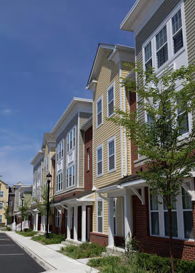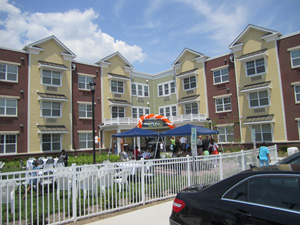
METRO'S ROLE:
As head of the development team and long-time advisors to the Orange Housing Authority, Metro has helped transform an obsolete public high rise project into a vibrant, new mixed-income residential community. The firm has overseen the overall planning, design and development of the project from its inception, and secured and arranged all of the financing for the project.
Recognizing Walter G. Alexander Village as an outstanding transformative project, Metro and the development team were recipients of the Governor's 2014 Excellence in Housing and Economic Development Award.
PROJECT OVERVIEW:
The existing project contained 140 public housing units in two, 7-story apartment buildings built in 1952. Tenants were relocated and the two buildings demolished to make way for the new development.
The Walter G. Alexander Village is a transformative project for the Housing Authority, the neighborhood and the city. A blighted, problem plagued and crime ridden high rise development has been replaced with quality, low-rise residential units for low, moderate and market-rate families and seniors within a socially diverse setting.

The design of the new housing in terms of scale, building height and architectural treatment, blends in with the rest of the neighborhood. New pedestrian friendly sidewalks bring new life back to the neighborhood. Streetscape improvements help make the area attractive and safe for children, families and senior citizens. The development also promotes mass transit use by encouraging residents to walk to the nearby Orange and Highland train station or the Brick Church train station in East Orange.
A PHASED PROJECT:
The first two phases were completed and have been fully occupied since April 2012. Phase I consists of 66 units of new family housing in three-story townhouse style buildings, consisting of 1, 2 and 3 bedroom apartments. Phase II has 48 senior housing units in a three-story building that is similar in architectural design to the townhouses. Phase III will contain 42 mixed-income family units in attached townhouse and apartment style buildings, and a 4,000 SF community center. Construction of the third phase is scheduled to begin late fall 2014 and will be completed within 12 months.
Financing for Phases I and II consisted of two separate 9% tax credit allocations from the New Jersey Housing and Mortgage Finance Agency (HMFA), private equity from Enterprise Community Investment Corporation, conventional construction and permanent financing from TD Bank and Enterprise, Replacement Housing Funds (RHF) from the Orange Housing Authority, and American Recovery and Reinvestment Act (ARRA) Funds, which were part of the federal stimulus package from the U.S. Department of Housing and Urban Development.
Phase III includes another 9% allocation of tax credits, RHF funds, special CDBG-Disaster Recovery Funds, and construction and permanent financing from NJHMFA.
RESULTS:
The total cost of Phase I was $19.7 million and $10.4 million for Phase II. The third phase is being developed at a cost of $12 million. Nearly $42 million is public and private investments are transforming this inner city neighborhood into a new, vibrant and desirable residential community.
Key to the success of the project was Metro’s ability to secure an unprecedented two tax credit awards in the same highly competitive funding round so that both Phase I and Phase II of the Walter G. Alexander Village project proceeded simultaneously.

Renderings by Kitchen & Associates Architectural Services, PA





